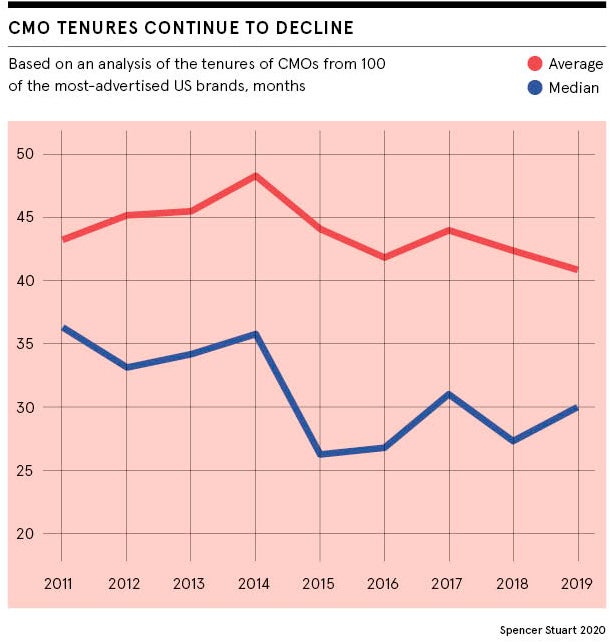
Earlier this year, Three UK reinterpreted the traditional CMO role and merged marketing with its customer team. Johnson & Johnson abolished the title of CMO, while McDonalds and Coca-Cola have reinstated their CMO positions, reversing earlier moves to replace them. But why are companies obsessed with changing titles? Should other companies follow suit in changing the CMO role to move with the times?
Yes: the CMO role is too broad and varied
According to executive research firm Spencer Stuart, chief marketing officers (CMOs) at the top 100 US advertisers are in post for just 41 months on average, compared with 76 months for their chief executives. This suggests the CMO role does not do exactly what it says on the tin and the title needs to be changed.
“Too many brands have lost sight of the importance of the 4Ps of marketing and have forgotten how to pull the levers of product, price, promotion and place,” says Christian Polman, chief strategy officer at Ebiquity, a marketing and media consultancy.
“Although focusing just on the four Ps in fact misses the point about the critical role marketing can play to influence consumer behaviour, drive business innovation, and help businesses recover and grow.”
Jason Ball, founder of business-to-business (B2B) marketing agency Considered Content, says: “In B2B, CMOs are expected to run everything from bottom-of-the-funnel lead generation and sales support all the way up to thought leadership and brand development.” According to Ball, the CMO role often requires delivering quarterly results, as their sales colleagues do, but without the foundation of a solid, longer-term strategy.
“This sets them up to fail because they’re never given the time and scope to deliver what really matters: enduring business growth,” he says. “So, we see this revolving door as businesses continually abolish and then reinstate the role.”
Stefano Maifreni, founder of Eggcelerate, a B2B consultancy for British and Italian small and medium-sized enterprises, points out that the CMO is fast becoming a chief customer officer, overseeing customer interactions and experiences. “My view is that, increasingly, many CMOs will act as product managers,” he says.
Digital marketing and the role of technology
For Sarah Shilling, CMO at marketing and communications agency Unlimited, the CMO role needs to be reimagined because of the growing power of technology. “There are many reasons for the CMO role being displaced, one being the change in the chief technology officer’s role and a sudden surge in programmatic around the customer journey,” she says. “Overnight, digital heads had a better handle on data and therefore a competitive advantage in understanding customers, how they behave and how to commercialise those behaviours.”
There are many reasons for the CMO role being displaced, one being the change in the CTO’s role and a sudden surge in programmatic around the customer journey
In the Customer Experience Trends Report 2020, from Zendesk, a support, sales and customer engagement software provider, two thirds of those asked cited customer service as the key driver for brand loyalty, ahead of price, product or service.
Peter Lorant, Zendesk’s chief operating officer, Europe, Middle East and Africa, says: “Your marketing team should have an interest in the insights your customer experience team derives from customer interaction and in turn should use these insights to create a unified, cohesive message in marketing, sales, service and beyond. Customer experience technology that unifies these teams can help make cross-departmental collaboration around customer needs second nature. C-suite members may come and go, but this customer-centric approach is here to stay.”

Demand for the near real-time metrics provided by performance marketing means there’s been less of a focus on longer-term brand building and this is why it’s time to rethink the CMO role, argues Martina Poehler, vice president of marketing at Fresh Relevance, which uses customer data to maximise the customer experience. “Marketing teams’ attention has shifted from the bigger picture and led to many becoming engrossed in lower-funnel advertising or digital advertising, to the detriment of building deeper and more valuable customer relationships,” she says.
The new title should reflect control over customer experience and renewed influence on the product roadmap, according to Poehler. “By managing all interactions between the company and the customer and orchestrating an experience that adds value throughout the customer life cycle, marketing will be able to grow the brand and drive profit in a meaningful and sustainable way,” she concludes.
No: clarity in a time of uncertainty is vital
Organisations should be cautious about changing the title of CMO title, unless it comes with an authentic change to the role or remit,” says Emma Robertson, chief executive of Engine Transformation, a digital and data consultancy. The CMO role’s function within an organisation is largely well defined, she argues, and this clarity shouldn’t be underestimated, especially in a period of disruption. “In our experience, effective CMOs are the consistent and committed voice of the customer, preventing organisations from being too inward looking.”
The CMO role is a relatively new one at Vodafone Business. “Previously, marketing was situated in our different lines of business, sales and strategy, but there was a realisation that we needed a marketing organisation which could take a more holistic approach, really get to understand customer needs and have a leader who can take a seat in the boardroom,” says Iris Meijer, the company’s CMO.
The challenge presented to the company by COVID-19 has validated the decision, she says. “Many organisations have had to rip up plans, answer new customer concerns and adapt their brand purpose overnight. This overhaul could not have happened without marketers steering the way,” says Meijer.
Rather than change the title or rethink the role, some marketers argue that CMOs and boards need to get back to basics. “A number of reports have identified CMOs have had the scope of what they are responsible for significantly reduced to the point that they are increasingly only responsible for marketing communications,” says Darren Savage, chief strategy officer, at Tribal Worldwide London, a digital experience agency. “The CMO role should be refanged with its lost responsibilities and expanded to include internal organisational elements around innovation.”
There’s already evidence this is happening. Tom Pepper, senior director of LinkedIn Marketing Solutions for UK, Ireland and Israel, points to recent research from the company that suggests nearly half of UK marketers (49 per cent) have had the opportunity to redefine their roles as a consequence of COVID-19’s impact on their business. “I’ve heard from multiple senior marketing clients that they feel they now have a seat at the board table, which wasn’t always the case,” he says.
Are today’s CMOs really chief growth officers?
Adobe International provides an example of how the CMO role is evolving without any need for a change of title. CMO Alvaro Del Pozo says: “Our teams are responsible for more than just promotional campaigns; they are the stewards of the customer experience, ensuring every single touchpoint from our digital channels across web and social, through to events and even the products themselves, is consistent, tightly integrated and delivers against the ever-increasing expectations of our customers.”
Amelia Stirling, chief markets officer at law firm Burges Salmon, agrees. “I’ve seen a greater focus on the whole customer journey, which requires the CMO to lead collaboration across all areas of the business, ensuring all the touchpoints contribute in a meaningful and consistent way to the overall experience,” she says.
According to Michael Frohlich, chief executive of Ogilvy UK, changing the title or allocating the CMO’s responsibilities to other departments can lead to siloed thinking. “Marketing needs to be woven into the core of the business, requiring a more collaborative and joined-up role,” he says. “A deep understanding of the needs of the business the CMO works in and how combining responsibilities to achieve greater impact is where value is to be found.”

Earlier this year, Three UK reinterpreted the traditional CMO role and merged marketing with its customer team. Johnson & Johnson abolished the title of CMO, while McDonalds and Coca-Cola have reinstated their CMO positions, reversing earlier moves to replace them. But why are companies obsessed with changing titles? Should other companies follow suit in changing the CMO role to move with the times?





